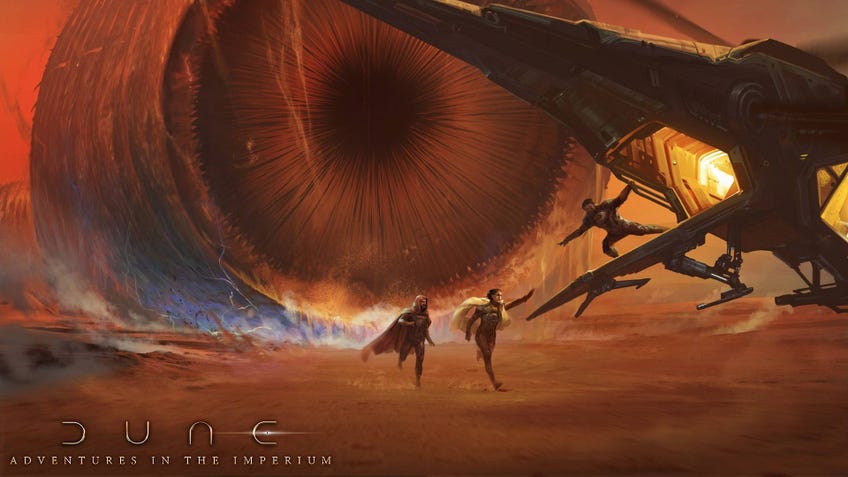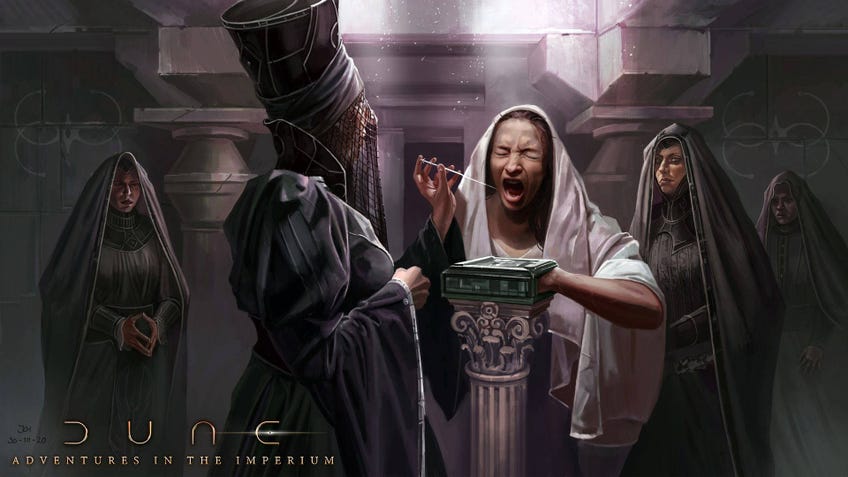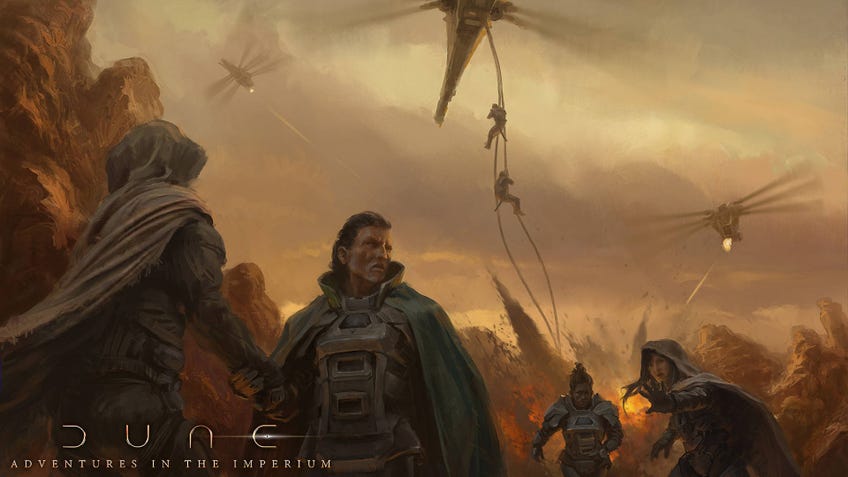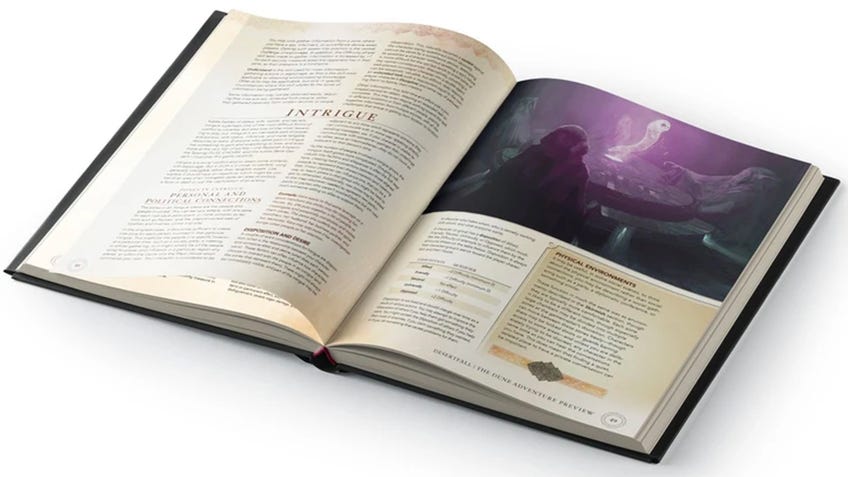Dune: Adventures in the Imperium RPG review - as dense and complex as the sci-fi classic
The dice must flow.
As with the universe it draws from, the tabletop RPG adaptation of Dune is richly detailed and operates on a truly majestic scale, offering stories that span all the way from hardscrabble survival to galactic conquest. With this, though comes a monolithic weight of interlocking game systems and lore that can easily cause newcomers to bounce right off it and go looking for something a little bit less intimidating.
Honestly, though, it’s hard to tell whether this is a flaw with the game itself, or simply the natural consequence of trying to bring such a dense setting to the tabletop. The universe of Dune is a wild blend of sci-fi and fantasy packed with factions, technology and laws that are utterly integral to understanding what makes the world tick. The first major chunk of the core rulebook is a lore dump that stretches to about 70 pages, and is near-mandatory reading for everybody who isn’t already a committed fan.
Yes, skipping explanations of exactly why everyone is so keen on securing the mysterious spice drug – beyond the simple fact that Dune was written in 1960s California – and the vast implications this has for the desert planet Arrakis would make things much simpler. However, leaping into a session without this background information percolating through your brain kind of defeats the point of playing in the setting in the first place.

The same could probably be said of some of the more complex rule systems found deeper into the book. Things would certainly have been more streamlined if the designers had stuck to the standard skirmish-level combat system common to countless traditional RPGs, but expanding the rules to encompass one-on-one duels, espionage missions and full-blown warfare plays a major part in making things really feel like Dune.
Things really feel like Dune.
While this does make Dune: Adventures in the Imperium a tough meal to get started on, some smart decisions mean that once you do get started it’s not too tricky to digest.
Some of this is down to the RPG’s careful focus on what, when and where you’re likely to be playing. Rather than dumping you in the silk slippers of any old citizen of the Imperium at some nebulous point in its 20,000-year history, the core premise of any campaign is that the party are members, supporters and employees of a noble household at roughly the same point in time as the original novel. Make no mistake, the scope of potential campaigns remains titanic, but these limitations at least help to make things feel somewhat manageable.

While the rules have an incredibly wide range of applications, they’re reasonably simple to handle once you’ve put in a couple of hours. The core of the game is based on Modiphius’ 2d20 ruleset, which powers RPGs including Star Trek Adventures, Conan: Adventures in an Age Undreamed Of and about a half-dozen others beyond. As you may guess from its name, the running theme of the system is that whenever characters run into challenges, they need to roll a couple of 20-sided dice. Every die that comes in under some target number counts as a success, with the amount needed depending on just how sticky the situation might be.
The handful of drives you have access to all-but force characters to constantly consider some of the core tenets of the setting.
So far this is all standard 2d20 stuff, but Adventures in the Imperium adds in a generous handful of twists that help the gameplay cleave closer to the feel of the universe. For a start, where many other roleplaying games use some combination of raw stats and trained skills to determine the target number, this time around your character’s drives play just as big a role as their natural abilities. A swordmaster who is utterly devoted to their house might get big bonuses when they’re fighting to protect the next heir from assassins, but find things harder when acting purely for their own ends.
Cleverly, the handful of drives you have access to all-but force characters to constantly consider some of the core tenets of the setting. It’s almost impossible to create a shallow, story-dodging murder-machine when concepts like faith, duty and justice are just as mechanically impactful as your battle skill.
The other major change-up to the regular system is the focus on assets and traits. These can both be thought of as ways to abstract all the complicated and complex details of the Dune universe into bite-size mechanical chunks, and should be familiar to anyone who has dabbled in the Fate RPG.
Assets represent tools that characters can use to achieve their goals - whether that takes the form of a nuclear weapon or a key to the baron’s private quarters - while traits act as modifiers that can make the situation easier or harder depending on how things shake out. If the GM gives the enemy castle bright spotlights it might add an extra point of difficulty onto your infiltration tests, but the poisoned trait on your dagger is going to make things a bit easier when it comes to finishing the deed.

This can all seem somewhat fussy if you haven’t played with these kinds of systems before, but this network of assets and traits is what allows the Dune RPG to span so many different scales and situations. In a stand-up fight you might use a single gun as an asset, while in full-blown battle an entire crate of them may serve the exact same purpose. As far as the rules are concerned, there’s really no mechanical difference between a high-quality sword and a juicy bit of gossip; both of them simply boost the impact of successful attacks, whether you’re aiming at an enemy’s throat or their reputation.
Adventures in the Imperium makes it possible to play in something that at least approximates the weirdness of the Dune universe.
Somehow, the network of systems and rules Modiphius’ team has thrown at Adventures in the Imperium have managed to make it possible to play in something that at least approximates the weirdness of the Dune universe. This is a rather impressive achievement.
It’s worth remembering, however, that this doesn’t necessarily mean that everyone needs to leap down to your game store and grab a copy right this second. Despite its clever implementation, the ruleset definitely leans towards the more complex side of things and you really do need to chow down on a fair amount of lore if you’re going to get the most out of playing.

On top of this, it’s hard to ignore that Dune simply isn’t a universe that everybody is going to want to explore. The original novel is rapidly approaching 60 years old and some of the themes, such as the presence of a shadowy all-female organisation looking to control the galaxy from the shadows, feel a little dated. Fortunately, a rather excellent GMing section does try to help guide groups through the more potentially problematic areas of the fiction.
Of course, if you’re already a fan of the novels - or, somehow, David Lynch’s catastrophic attempt at bringing them to the silver screen - you’ll already know all about this, and you’ll know whether or not you want to bring your friends in to explore it with you.
If you aren’t invested in the universe, but like the sound of a complex sci-fi setting that can blend majesty and desperation in a single scene, Adventures in the Imperium may well be a path into a fascinating new universe. Just remember: He who controls the spice, controls the universe.
Dune: Adventures in the Imperium is due for release later in May 2021.





